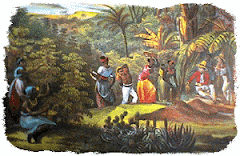'Coffee is not just a refreshment. It possesses symbolic value as part of our day to day social activities. Often the ritual associated with coffee drinking is much more important than the act of consuming the drink itself', (Giddens 2006: 5).
একাপ কফি আৰু ইটো সিটো বহুতো.....
〜 Ritwik Rupam Sarma*
একাপ কফিৰ মাজেদি মই বিচাৰি ফুৰোঁ সমাজৰ মাজলৈ যোৱা বাটটি
মোৰ নিসংগতাক আৱৰি ৰাখিব পৰাকৈ এক উমাল সান্নিধ্য বিচাৰি৷৷
ধূমায়িত কফিৰ মাজেৰে মই শেষ কৰিব খুজোঁ মোৰ নিসংগতাৰ বুৰঞ্জী,
মানুহৰ মাজত থাকিও অকলশৰীয়া আত্মা এটিৰ কাহিনী৷৷
পুৱাৰ কফিকাপে মোক সাজু কৰে দিনটো লগ পাবলগীয়া সমাজৰ সম্মুখীন হ'বলৈ
দুপৰীয়াৰ কফিকাপে সাহস দিয়ে অফিছৰ ব্যস্ততাৰ সুৰুঙাৰ মাজেৰে মনটোক জীপাল কৰিবলৈ৷
সন্ধিয়াৰ কফিকাপে পাহৰাই দিয়ে দিনটোৰ ব্যস্ততা
আড্ডাৰ মাজেৰে জীৱনৰ ৰঙীন ব্যাখ্যা !!
কফিৰে ধূমায়িত ৰঙীন সন্ধ্যাবোৰে আমাক পাহৰাই দিয়ে কফি বাগানৰ শ্ৰমিকসকলৰ হাতৰ ঘামৰ গোন্ধ।
গীটাৰ,গানৰ মূৰ্চ্ছনাত হেৰাই যায় শ্ৰমিকৰ ভোকৰ আৰ্তনাদ,
সকলো পাহৰি একাপ কফিৰ মাজেৰে আমি ৰচোঁ আমাৰ প্ৰেমৰ ৰঙীন ভৱিষ্যতৰ বেলাড৷৷
পুঁজিবাদৰ হাতোৰাত পিষ্ট হৈ ঘৰৰ কফিকাপ কোনোবা কেফেত হৈ পৰে ৩০০ টকীয়া মনোৰঞ্জন,
দুখন সমাজ কৰি নিৰুপণ৷
এখন সমাজে খাই মৰে এখন সমাজে নাখাই মৰে
এখন সমাজৰ বাবে কফি বিলাসিতাৰ সামগ্ৰী
কিমান কি প্ৰকাৰৰ কফিৰ বিকলপ যে থাকে বিচাৰি৷
আনখন সমাজৰ বাবে আকৌ কফি জীৱিকাৰ সামগ্ৰী
কফিৰ খেতিৰে জীৱন চলাই যোৱাত আগ্ৰহী৷৷
আপোনাৰ একাপ কফি......
আমাৰ বাবে জীৱনৰ বিভিন্ন এপিটাফ-একাপ ধূমায়িত কফি।।
*Ritwik Rupam Sarma is an Assistant Professor in the Department of Sociology, Gauhati University, Assam
_______________________________________________________________________
Coffee is an interesting object to study human history and society.
 |
| Edward Ward's The Coffee House Mob |
Coffee has occupied an important role in Sociological studies. For instance, in Habermas' understanding of the emergence of the public sphere, coffee houses in 18th century Europe played a crucial role (Habermas 1962). Similarly, Anthony Giddens looks at the social role that coffee plays in human lives and relationships (Giddens 2006). It has also been linked to capitalism and consumerism.
"In the seventeenth and eighteenth centuries, the London coffeehouse and the Parisian salon functioned as what Jürgen Habermas has identified as the public sphere: a place for social interaction outside the private sphere (the home) and the sphere of public authority (the state/court). Although there were many other public sphere institutions — in the form of clubs, theaters, Masonic lodges and the like — coffeehouses were the most important public sphere institutions in London and the same was true for the salons of Paris" (Calhoun 2008).
 |
| Depiction of coffee plantation in Africa |
These coffee houses imported coffee from the plantations in Africa, South America. While coffee was a valuable commodity in trade, the social relations in the plantations were mostly exploitative and often marked by slavery.
(Illustrations: web-books.com)
 |
| Coffee plantation in Bogota, Columbia |
 |
| Coffee Drying Grounds, São Paulo, Brazil |
In India, coffee is not only a popular beverage, but also allows us to understand the society. Coffee Houses were popular in the early nineteenth century. Cities like Kolkata, Delhi and others had iconic coffee houses that served as the a meeting ground for scholars, activists, and intellectuals. And today, we have cafes.
Click on images for interesting reads
 |
| Kolkata's College Street Coffee House |
 |
| Delhi's Indian Coffee House in Connaught Place. Source:The Indian Express. |
 |
| Shimla's iconic Indian Coffee House |
The story of the plantations is not very different from that of the plantations in Africa. In India, most coffee plantations exist in the Southern states of Karnataka, Tamil Nadu and Kerala. Workers there work in some of the most precarious conditions. The COVID-19 has severely affected these workers.
 |
| Workers from Assam in Karnataka coffee plantations |
Multinational coffee chains such as Starbucks have found a major market in India among the middle classes, especially those working in the corporate sector. In fact, Dalgona coffee became very popular as a 'quarantine recipe' in the lockdown amongst the middle-classes who could not go out to drink coffee.







Comments
Post a Comment